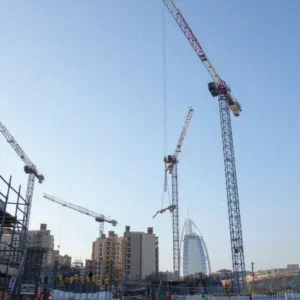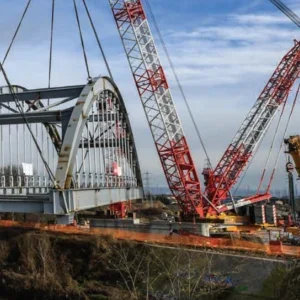Let’s not get sidetracked by the negative outlook for the industry, we agreed. On a sun-drenched, spring morning in Paris, we were probably feeling pretty good about life. Who were we trying to kid?
The grim reality of this recession is the same at Manitowoc as most other companies. Some of its manufacturing facilities are down to one shift, others are temporarily closed, 25% of its workforce has been culled. “And 2010 is going to be equally challenging, if not worse,” he says.
This interview, which was conducted backstage on Manitowoc’s stand on the Wednesday of Intermat 2009, was interrupted by a telephone call. Admittedly, I couldn’t follow the French dialogue but the conversation, just like ours, quickly turned to the state of the market, Etchart explained having put the phone down.
“That was one of our customers, one of the biggest rental companies we work with.” Probably detecting that I’d be interested in what was discussed, he proceeded without prompting. “I asked him how things were and we agreed that they’re not only bad now, but they’re unlikely to get better next year.
“I’ve spoken to many customers who have revised their 2009 budgets three or four times.
“Rental companies already have enough cranes and the value of rental and used equipment has gone down. We’re in one of those bad cycles that comes every 10 years or so. It’s a global financial crisis and no market is free from it.
“This show has only confirmed that. Everyone is pessimistic. The positives are that we have a chance to gain market share, get the edge over our competition and emerge from the crisis stronger than we went in.
“We have been through other bad times and we know how to manage it. We’ll continue to support our partners who we hope will, in return, continue to rely on us as an innovator of choice.”
Etchart agrees that the industry is enduring the opposite effects of the perfect storm that his predecessor Glen Tellock spoke of so fondly at the previous Intermat show in 2006.
True, Intermat this time was quiet. There were pockets of activity and a few new cranes. Manitowoc itself showed its GCK 3045, GSK 55 and TMC540 from its Grove brand, plus the MDT 368 tower crane from Potain and the CraneSTAR asset management system. But ultimately the global crane industry is in a state of rest.
Terex and Tadano were notable absentees from the exhibition area. “I can’t comment on companies that stayed away. We’re committed to the French market and we had new products to show. We’ve had new products in the pipeline and it makes no sense to delay the launch. It would be a mistake to withdraw from any market.
“The cost of ownership has taken on a new significance for customers so that has to fit into our marketing plans. This includes lower life cycle costs and the resale value of our equipment.
“We believe our global manufacturing spread will allow us to be flexible in shifting production to fit demand. At the moment, the orders for smaller RTs are being cancelled and housing is bad, but wind power is still okay and large cranes are still in demand.”
Big surprise
Etchart rates the crash of Western Europe as a “big surprise”, but Spain, for example, “has been buying for years and it couldn’t sustain this level of demand.
“From 2002-2008 this industry was in a rapid state of growth. In 2003 Manitowoc took less than $1bn in sales, last year that rose to $4bn.
“All of a sudden the mindset changed and people were caught by surprise. I was in Dubai in October last year and even then there was still a bullish mindset. Globally, business was fine until about a month before that. It changed so quickly and we started to see projects being pulled back. It was almost as if things were good on the Friday night then on the Monday morning we were in recession. Tower cranes took a big hit.
“Our first reaction was to look at our staffing levels. This largely effected the manufacturing divisions but we had to lose some people from other parts of the business. First we let our temporary staff go, then permanent. Some of our manufacturing facilities have been temporarily closed. France, for example, has temporary unemployment schemes which we have taken advantage of. At the moment, we have no plans to permanently close anything.” That said, it represents a stark contrast to the three shift regime that most companies were working to even as recently as last year.
Etchart speaks from experience. “In June 1997 I was given the opportunity to move to Singapore. ‘Everything is happening in Asia,’ I was told. A month later the market collapsed and for two years it was really tough. A lot of companies pulled out of the market but it was a mistake. We started manufacturing Potains in China and opened new facilities. Customers remember who was there in the bad times.
“China will most likely be the first of the world’s geographies out of the crisis. Its government has been proactive and, while it’s too early to suggest it’ll set a trend, it’s arguable that we’ve already seen orders picking up there.
“North America will recover sooner than others as well. There’s a new optimism about things there. I’m pessimistic about Europe, while Japan will be down for years.
“But I’m only guessing,” says Etchart, who is, after all, only using the same crystal ball as the rest of us.






